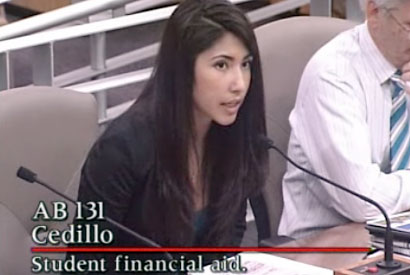With governor’s signature, undocumented students get a leg up on the American dream
Passage of AB 130 means Berkeley and other state colleges and universities can award privately funded scholarships to undocumented students, but not yet — as envisioned by California Dream Act supporters — state-administered financial-aid programs.
July 25, 2011
The dream of a college education and a better life, long out of reach for many undocumented students, took a significant step closer to reality today with the signing of AB 130, one leg of a two-part legislative package supporters have dubbed the California Dream Act.

At a state Senate hearing in June, an undocumented Sacramento State graduate testified in support of the California Dream Act.
Gov. Jerry Brown’s signature on the measure, which was authored by Assemblyman Gilbert Cedillo (D-Los Angeles) and vigorously championed by UC Berkeley Chancellor Robert Birgeneau, means that all students who qualify for an exemption from paying nonresident tuition under a 2001 law, AB 540, will be eligible to compete for privately funded scholarships awarded through the UC, CSU and community-college systems.
The bill went to the governor July 20, soon after winning passage by the state Senate. A companion bill authored by Cedillo, AB 131, would broaden the aid available to so-called AB 540 students, allowing them to apply for and participate in any state-administered student financial-aid program, including institutional aid and Cal Grant awards.
The fate of that legislation, currently on the suspense file in the Senate Appropriations committee, remains uncertain.
Birgeneau has been a staunch advocate for both bills. Testifying in the state Capitol in June, Birgeneau told the Senate Education Committee that the full costs of a Berkeley education often exceed undocumented students’ total family incomes. He called AB 131 “a critical component of ensuring that these students can attend UC Berkeley.”
On Monday, the chancellor applauded Brown and the Legislature for taking action on AB 130, and urged elected leaders to continue making college more accessible to undocumented students not just here but throughout the United States.
Birgeneau called today’s action “an important first step toward realizing the California Dream Act,” and said the new law “will enable immigrant students, many of whom were brought here as young children and are products of California’s education system, the opportunity to compete for private scholarship dollars to help finance their higher education.”
“I am proud to have played a role in helping to advance this legislation,” added the chancellor. “I am hopeful that we also will see the federal Dream Act become a reality, so that these sons and daughters of California will have a path to citizenship and an opportunity to contribute fully to the economic and social vitality of our great state and nation.”
Many AB 540 students do not identify themselves as such, and there is no official record of the number enrolled at Berkeley; estimates are that some 75 students could qualify for aid under the new rules. But the challenges facing undocumented students have been a matter of concern to many at Berkeley, and the issue has strong support from the chancellor in Sacramento, Washington and here on campus.
In 2010, at the urging of a group of students and staff, Birgeneau commissioned a task force to articulate the issues and needs of undocumented students and devise a plan to assist them. The panel’s recommendations are expected to be released during the fall semester.
In signing AB 130, Gov. Brown called the new law “another piece of an investment in people,” according to a Los Angeles Times blog by a writer who was there. But, the post went on, he said he was not yet ready to commit to signing a second piece of the Dream Act, if the Legislature passes it.
Cedillo, in a statement issued after the signing, said, “Today is a wonderful day, where leadership gathered and demonstrated their commitment to the future of California. Thousands of undocumented students will now be able to achieve their own personal dreams with this important legislation, and invest in the future of California.”